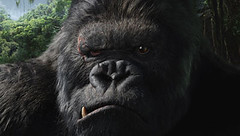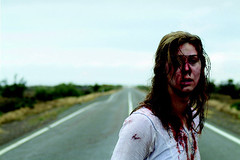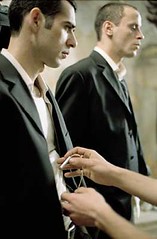King Kong
Starring: Naomi Watts, Jack Black, Adrien Brody
Director: Peter Jackson
 We know this one.
We know this one.
Boy meets girl. Falls helplessly in love, would die for her.
Only boy is an ape.
A big ass ape.
Now rope in that guy who did the Lord of The Rings movies.
Now let's break it down.
Peter Jackson’s King Kong doesn’t stray too much from the original: Visionary/Lunatic director Carl Denham (Jack Black) shanghai writer Jack Driscoll (Adrien Brody) and starving actress Ann Darrow (Naomi Watts) into following him to the mythical Skull Island on what turns out to be the most ill-fated location shoot in the history.
The first act, the journey to the island, is merely time for us to discover that character has lives and dreams and personalities and stuff. Frankly, it's dreary stuff. Thank God there's the island.
Time on the island is one long escape scene as our party land and are beset upon by murderous savages, stampeding dinosaurs, giant bugs and a certain 25-storey tall ape. All that experience on Rings (long breathless fight scenes, hordes of CG creatures) frees Jackson's hand as he unleashes the full arsenal of Skull Island's winged, fanged and generally hungry inhabitants on his actors.
And here is where irony enters stage left.
- Getting Brody and Watts, good as they are, isn't necessary given how little their characters do - or mean. Kong is by far the most able performer (Andy 'Gollum' Serkis, cornering the motion capture market), with the WETA wizards crafting the most expressive non-speaking CG creature ever created.
- Kong also looks a little too much like the Lord of The Rings movies. Everything on the island, the creatures, the cameras angles, have a twin in the Rings movies. Even the savages are human counterparts to the Uruk-Hai.
- Though Jackson takes great pains to establish the kinship between Kong and Ann, the parts of the movie that work best are actually the ones devoid of plot i.e. Kong trying to smash T-Rexes, rocks, planes etc. The scenes between Kong and Ann are draggy and consist mostly of longing, doe-eyed stares in slow mo, bloating the movie's running time to a bum-numbing 3 hours. And since so much is invested in the romance between the roaring ape and his screaming blonde, the human love interest is reduced to a prop.
- We don't know why Kong and Ann love each other. We don't know why the island savages gave him sacrifices. We only know that he didn't eat them. And everything becomes so laboured, we ultimately don’t give a shit. (One possible reason for the female offerings is hinted at via a slightly worrying but familiar hand-motion, but we can – won't – get into that.)
So is it all crap?
Well, no.
Jack Black’s Carl Denham makes for some interesting viewing. His ambition devolves to desperation and then rutlessness as he tries to salvage something, anything, for his movie as things go spectacularly apeshit. Pity Jack doesn’t quite have the range to make the most of his character’s transformation.
And there is Kong. And the moment he bursts onto screen, every time he beats something to a pulp (the T-Rex battle is one of the most violent, but satisfying fights ever put on screen), this much is obvious: A lot of love went into him.
He is a living, breathing, acting creature.
And every scene he was in, he stole.
 There are very few good horror flicks these days.
There are very few good horror flicks these days. Post 9/11, almost every take on terrorism has fallen into two stereotypes: the extremists or the sympathisers. This is the first movie I’ve seen told from the viewpoint of the terrorists themselves.
Post 9/11, almost every take on terrorism has fallen into two stereotypes: the extremists or the sympathisers. This is the first movie I’ve seen told from the viewpoint of the terrorists themselves.




